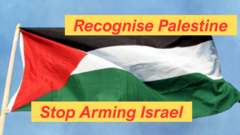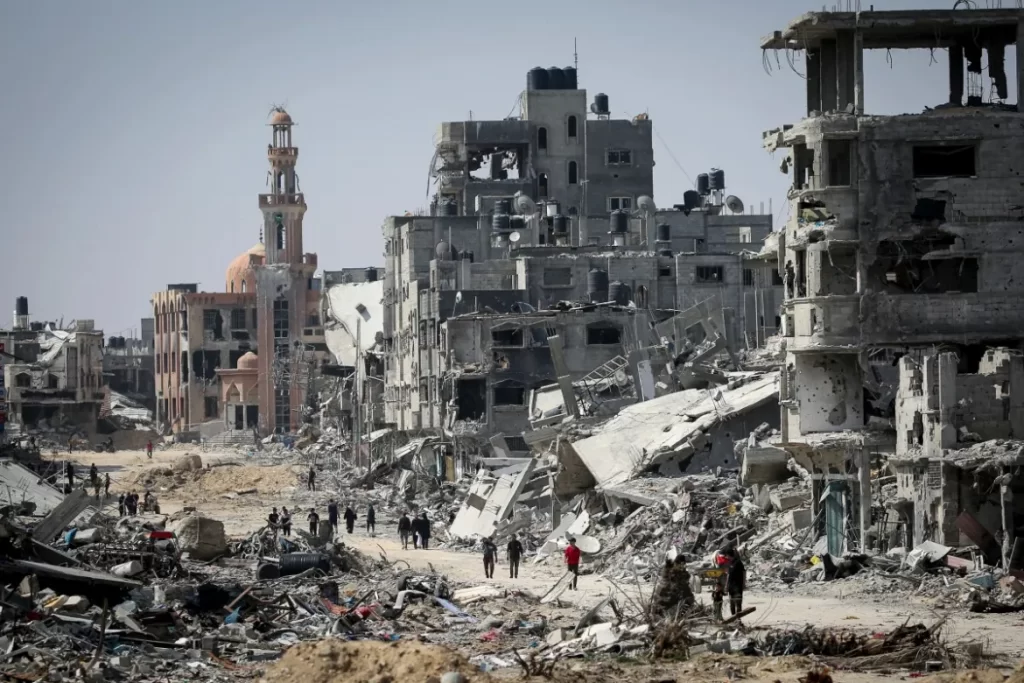
Labour CND welcomes the UK government’s recognition of the state of Palestine, alongside Canada, Australia, and Portugal ahead of the 80th session of the UN General Assembly (UNGA) this week, and recognises France, Belgium, Malta, and others are likely to do so during the course of the General Assembly, which will discuss Israel’s genocide in Gaza.
Labour CND supports all steps which highlight Israel’s illegal, unjust, and discriminatory treatment of the Palestinian people with the de facto support of the United States.
Two years of Israel’s war on Gaza, together with a growing number of forced and illegal seizures of West Bank land by Israeli settlers, backed up by the Israeli Defence Force (IDF), are shattering Israel’s impunity. After decades of acquiescence in the barbarous treatment of the Occupied Palestinian Territories of Gaza and West Bank, the majority of the world’s states and international institutions are speaking up and speaking out.
Palestine is already recognised by 150 of the 193 UN members and has diplomatic missions in many countries including Britain. The Palestinian Authority has permanent observer status at the UN, which allows it to take part but without the right to vote. Yet Palestine does not have full control of its territory or people; it has no internationally agreed boundaries or capital city, and no army. Israel remains an occupying force which fails to recognise the human and political rights of the people of Palestine.
International opinion
The overwhelming support of UN member states for the recognition of Palestinian statehood is symbolic of the shift in international opinion which has taken place over the two years of Israel’s horrendous war on Gaza. Acceptance of Palestine as a UN member state would convey significant practical rights across the international arena. The weight of the permanent five members of the UN Security Council (UNSC) however, is a serious obstacle in the way of the majority will being expressed.
States are admitted into UN membership by a two-thirds majority vote by the General Assembly. Before this takes place though, the application for membership is first considered by the Security Council Two conditions must be fulfilled before a vote of the General Assembly takes place:
— Nine out of the 15 UNSC members must cast a positive vote for the recommendation.
— Even then, however, a recommendation for membership cannot go forward to the General Assembly if one of the five permanent members of the Security Council – China, France, the Russian Federation, the UK, and the USA – votes against the application for membership.
Trump’s obstruction
China and Russia have long since recognised the state of Palestine, the UK did so this weekend. If France recognises Palestine at the UN this week, as it has committed to do, only the US stands in the way of Security Council approval for Palestine’s membership of the UN. After the Oslo Accords of 1993 and ’95, which were opposed by a majority of the Palestinian people, the US recognised the Palestinian Authority (PA) as exercising limited Palestinian self-governance over the Occupied Palestinian Territories.
The current administration, however, opposes even the most limited form of Palestinian independence. President Trump acknowledged this in a press conference with Prime Minister Starmer during the recent state visit.
Last week the US denied an entry visa for the Palestinian Authority delegation to attend this week’s General Assembly. In response, the UN majority has voted to allow the PA to submit a pre-recorded statement to be played in the General Assembly and participate via video conference. The US was one of only five GA members to vote against this procedure, ‘explaining’ its negative vote by claiming the Palestinian Authority undermines any prospects of peace and ‘rewards and incentivises terror’.
The procedure by which a state is admitted into UN membership means it lies in the hands of the Trump administration to block UN membership of Palestine, just as the ability to call a halt to the atrocities against the people of Gaza also lies with Trump.
Palestinian statehood is by no means the only occasion on which the US has frustrated the majority will of the UN. This happened in the case of the Treaty on the Prohibition of Nuclear Weapons (TPNW).
The Nuclear Ban Treaty is the first legally binding international agreement to comprehensively prohibit nuclear weapons. After decades of preparation, it was adopted by 127 votes at the UNGA in July 2017 and opened for signature that September. It came into force in January 2021, when 50 states had ratified the Treaty. To date, 94 UN members are signatories to the Treaty; 73 have incorporated it in into law. The International Red Cross-Red Crescent has championed the Treaty. Thousands of scientists across the world have signed an open letter in support, and many faith communities have called for its adoption.
When the UN voted for the TPNW in 2017, the US, UK, and French delegations issued a joint press statement rejecting the Treaty, saying they had not participated in the negotiations and did not intend to sign, ratify, or become a party to the TPNW because it was incompatible with nuclear ‘deterrence’. To date, no nuclear weapons state has signed or ratified the the Treaty on the Prohibition of Nuclear Weapons.
Time for change, time for action
The General Assembly is the only UN body where every member has a say. As in the case of Gaza, majority opinion can carry moral authority and exercise influence on a range of UN agencies. But its decisions are recommendations only. It’s time to recognise – and tackle – the anti-democratic practices that nuclear-armed states such as the US can exercise as permanent members of the UN Security Council.
Meanwhile though, the most practical and immediate pressure the UK can bring to bear to stop the genocide and starvation in Gaza remains that of ending all arms exports to Isreal – including so-called secondary arms sales such as the supply of 15% of parts used in building US F35 fighter jets which have bombed Gaza for the past two years. It should do so now.
Labour CND says
Recognise Palestine !
End the genocide !
Stop Arming Israel !


